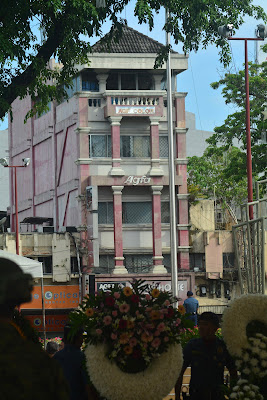I'm just fascinated by this old building standing unobtrusively, almost obscurely, along City Hall Drive and caught my camera on Independence Day. While waiting for the VIPs to arrive, my camera felt very impatient and explored the vicinity of the square some distance away. We were allotted a standing space without any chair to sit on so it really tested my endurance, especially as my hipbone was hurting that morning. So, the camera roamed around and happened to look up at the trees--there were about eight full grown trees left standing at the City Hall grounds, had they cut all the others? and beyond the trees, this particular building, so fascinating because it looked so old. What story could it be telling me? The drive on its ground floor was often crowded with people milling around, doing some business with City Hall, vendors hawking, or selling fruits like sliced papaya, singkamas, raw mangoes; or banana cues and later, siomai, binignit, used to line up the sidewalks outside the camera shops next to this building, photocopiers, laminating shops, photo studios and Davao's oldest bookstore, the Velasco Bookstore, lining down the entire stretch of the drive that ends at the Jaltan outlet where it meets Magallanes Street in the corner.
Is Agfa Building the real name of the building? And why is it named Agfa in the first place? Yes, I know it had something to do with Agfa film but I want to know exactly what and how.














